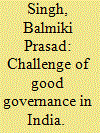| Srl | Item |
| 1 |
ID:
081935


|
|
|
|
|
| Publication |
2008.
|
| Summary/Abstract |
The Turkish party system experienced a serious blow in the early 1980s, when the military government in power closed down all the former legal political parties. Therefore, little evidence of strong psychological ties between voters and the political parties they supported at the polls is expected. This essay draws upon existing literature on voting behavior to develop four hypotheses to explain partisan affiliations of Turkish voters. Each of the hypotheses is then put to empirical tests, using data collected by means of a nationally representative survey. The four independent variables used in the four hypotheses are the role of parents' party identification (socialization), ideological orientations, economic expectations, and the ethnic identities of voters. Socialization emerges as a major determinant of partisan affiliation with the relatively older Republican People's Party (CHP) and Nationalist Action Party (MHP), while identifiers with the governing Justice and Development Party (AKP) take few cues from their parents and pay more attention to the economic performance of that party in government. Ideology seems to play a major role in determining the psychological orientations of those who feel attached to the CHP versus the AKP or the MHP but little role in differentiating AKP from MHP voters. Ethnicity only plays a role in partisan affiliation with the MHP
|
|
|
|
|
|
|
|
|
|
|
|
|
|
|
|
| 2 |
ID:
082573


|
|
|
| 3 |
ID:
081831


|
|
|
|
|
| Publication |
2008.
|
| Summary/Abstract |
The year 2007 witnessed a continuation of a five-year dynamic momentum evident on several fronts, notably a fast-growing economy and a vivid sociopolitical landscape, coupled with an active diplomacy. People's standard of living has improved and a sense of confidence and hope in a better future has permeated the populace. Viet Nam's scorecard on the diplomatic front continued to show impressive gains. Yet, momentum can be sustained only if limitations in institutions, education, and infrastructure can be addressed effectively
|
|
|
|
|
|
|
|
|
|
|
|
|
|
|
|
| 4 |
ID:
081934


|
|
|
|
|
| Publication |
2008.
|
| Summary/Abstract |
zmir occupies a place of its own in the Turkish election geography. It is a place where political parties with strong centrist tendencies have always prevailed in both local and general elections, ever since the establishment of a multiparty political system more than half a century ago. In this outcome, the sui generis socioeconomic and political characteristics of zmir play a determining role. Since the mid-1990s, the representational crisis that the center-right-wing political parties in particular have suffered has laid the ground for the rise of the Justice and Development Party (AKP) in zmir. This party was established before the 2002 elections, and despite its origins on the Islamic right, it has since evolved into a representative of the new liberal-conservative trend in politics. In the July 22, 2007 elections, this party won 30 percent of the votes. In this essay, a comparative analysis of the electoral preferences in zmir in the November 3, 2002 and the July 22, 2007 elections and the changes in electoral preferences together with their underlying reasons are presented.
|
|
|
|
|
|
|
|
|
|
|
|
|
|
|
|